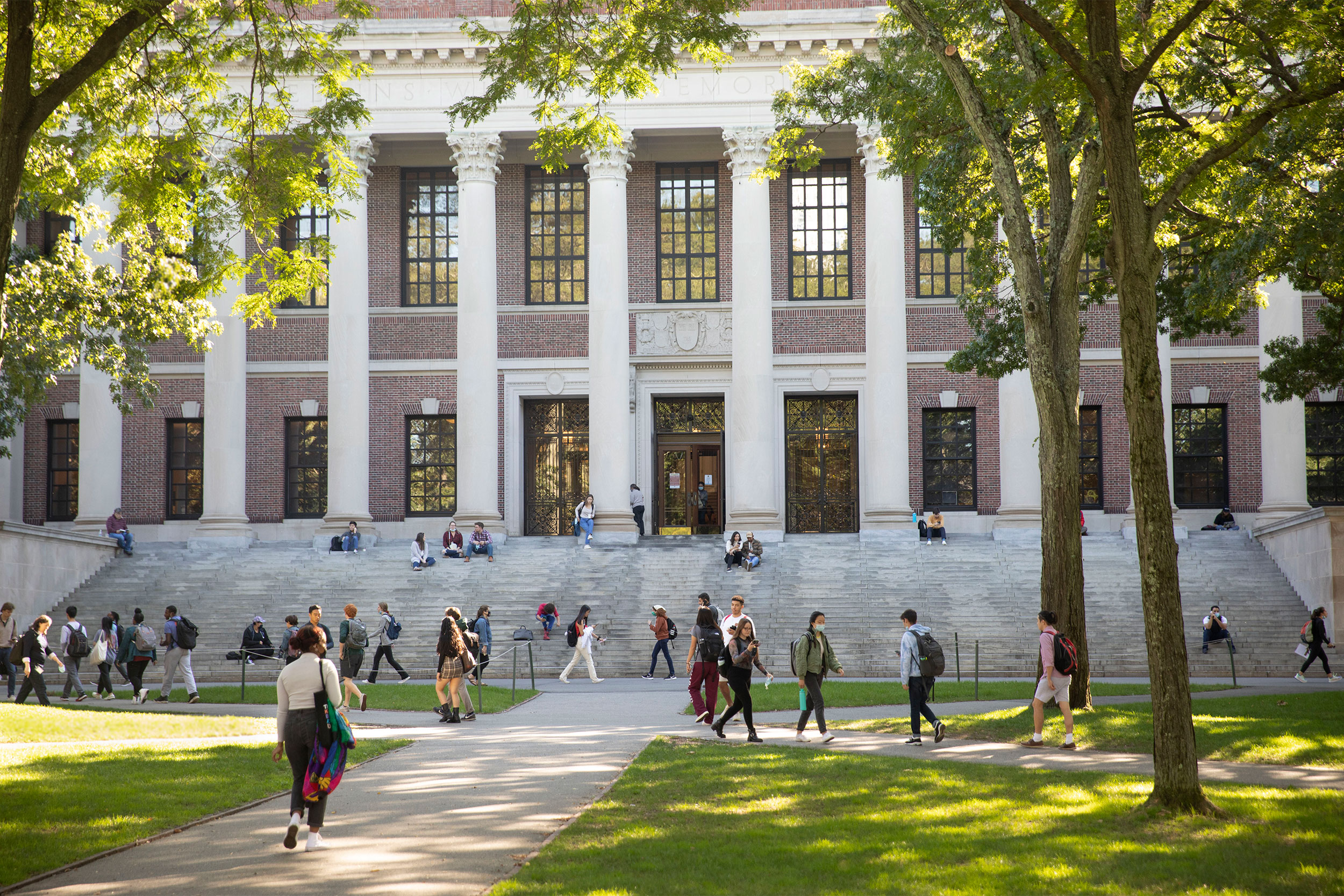
Widener Library in Harvard Yard.
Kris Snibbe/Harvard Staff Photographer
12 win Harvard Culture Lab awards to advance inclusion and belonging
Community-based projects will benefit University Schools and units
The Office for Equity, Diversity, Inclusion, and Belonging announced 12 teams as grant recipients for the 2023–24 Harvard Culture Lab Innovation Fund. Since launching in 2019, HCLIF has invested a quarter-million dollars annually to fund initiatives, research, and resources advancing inclusion, belonging, and engagement across the Harvard community.
“HCLIF partners with members of the University community to lead and innovate in the areas of diversity, equity, inclusion, and belonging,” said Sherri Charleston, Harvard’s chief diversity and inclusion officer. “These grants support the work of faculty, staff, students, and researchers from different backgrounds and belief systems from across campus who are working together to achieve our shared goal of building community.”
This year’s recipients include community members from across Harvard’s Schools and units, fulfilling the first grant requirement to work as a team and address critical challenges in equity, diversity, inclusion, and belonging together.
“Each project helps foster a greater sense of belonging, I hope, for everyone in the community.”
Hana Omiya, HCLIF project director
The awardees include The Neurodiversity Project, an initiative focused on making Harvard a more neurodiversity-friendly space by creating awareness and understanding of the variations of the human mind. The project’s affinity group aims to foster inclusive excellence and belonging through neurodiversity-centered connections via monthly meetings, open dialogues, and events. Led by Harvard Medical School instructor Walid Yassin, in collaboration with the faculty of Arts and Sciences’ Academic Resource Center, Yassin says the project “cultivates inclusion and belonging as it relates to the diversity of the human mind and seeks to make Harvard a space for everyone to nurture their unique strengths.”
At the Kennedy School, Uncovering Accent Bias at Harvard, another awardee in this year’s cohort, is led by researcher Tyler Pugeda alongside teams from multiple Schools. The project calls attention to the challenges people who have experienced accent bias face. “We discovered that people care deeply about projecting their unique voice, but they suffer from self-consciousness and fears due to stereotypes surrounding speaking styles,” said Pugeda. “Because the way we speak truly reflects our life’s journey, we are creating a unique opportunity for the Harvard community, and eventually society, to foster an open and respectful dialogue about embracing diverse speaking styles, eliminate stereotyping, and recognizing talents beyond speech.”
Funded by the Office of the President, grants range from $5,000 to $25,000. Proposals undergo two rounds of judging and are scored based on their alignment with the priorities outlined in the Presidential Task Force Report on Inclusion and Belonging and the strategic goals of OEDIB.
“Winning proposals effectively respond to essential questions about how an inclusive and equitable culture can be sustained at Harvard,” said Hana Omiya, OEDIB assistant director for administrations and operations and project director of HCLIF. “Each project helps foster a greater sense of belonging, I hope, for everyone in the community.”
2023-24 HCLIF recipients
Beyond Access, a celebration of the International Day of Persons with Disabilities featuring artists, dancers, and creators from around the world.
A Collaborative Project of Inclusive Anatomical Images corrects exclusionary biases in medical education by producing images of all bodies.
First-Generation Low Income Visibility Week, a second-year awardee, empowers the identities of students who are first in their family to pursue a degree in U.S. higher education.
The Greenhouse, a biweekly healing sanctuary centering Black, Indigenous, and people of color for all members to compost grief and germinate healing.
History Design Studio, a revival of the digital studio that develops innovative storytelling methods at the Hutchins Center for African and African American Research.
Inclusive Teaching Institute, a second-year awardee, hosts an instructor peer-learning fellowship and develops a publication to share inclusive teaching practices.
Lighting for Diverse Skin Tones, a University-wide workshop for media producers and photographers to professionally light all skin tones.
Multicultural Staff, Faculty, and Researchers Association, a place for employees from cross-cultural backgrounds to engage in international EDIB events.
The Neurodiversity Project, another second-year awardee, celebrates the spectrum of the human mind by supporting the neurodivergent community at Harvard.
Nunchi Health, a free mental health program for students interested in removing barriers and improving well-being centering immigrant-origin and international experiences.
Redefining [In]visibility, a project that invests in technology and tools that make dormitory life more accessible for blind and visually impaired students.
Uncovering Accent Bias at Harvard, a video series initiative exposing the prevalence of accent bias and its impact on recruitment, retention, and social mobility.
Applications for 2024-2025 Harvard Culture Lab Innovation Fund grants are now open to Harvard students and employees with ideas that foster belonging on campus and are due by March 29. To learn more about the fund and application, attend the Virtual Open House on March 6 at 11 a.m. Harvard community members interested in participating as a judge for the 2024-2025 HCLIF grant applications can sign up online.




